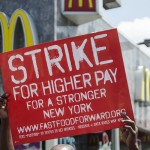Yesterday, the Federal Communications Commission voted 3-2 along party lines to consider allowing broadband companies to charge enterprises for faster delivery of their content. This follows a federal court decision back in January that threw out the FCC’s previous rules. The broadband companies are calling this a major step forward for the forces of the market. Firms that provide content are saying this is the end of the Internet-for-all that has served everyone so well. In truth, the FCC vote means almost nothing at all.
At this point, I can hear partisans on both sides of the issue gasping hysterically. And that is the problem with most of the discussion you have seen in the media — hysteria. I don’t think either side of the debate believes in its heart of hearts that it can win on reasoned argument only. The great flaw in democracy is that the votes of the emotional are many, while the votes of the thoughtful are few. Thus, “ginning up the base” is one of those horrible phrases that no longer needs explaining. The fact is that this fight is largely one between the likes of AT&T and Netflix. It’s a commercial battle between multi-billion-dollar industries. You with your little blog and your Amazon Prime account aren’t even part of the discussion.
However, in a democracy, it is important that the people, from whom legitimacy flows, have mechanisms to state their case to the powers that be. That is all that the vote at the FCC has done. The process is going to take ages, and it has only just started. The Notice of Proposed Rulemaking [NPRM] has set the clock ticking on a 120-day period of public comment. You are allowed to put your two cents in.
At the end of the four months of comments, the FCC can either issue a Report and Order or a Further Notice of Proposed Rulemaking. The R&O means new rules get published in the Federal Register, and there is a date given when they take effect. A Further Notice means that the FCC has reviewed the comments from the public and wants to kick the can down the road. In effect, more time is given for public comments while the FCC commissioners await a new election result, a technological innovation or a court decision that changes the political landscape and allows them to make a decision with less pressure from outside forces.
Even if an R&O comes out, people who aren’t happy with the decision can file a Petition for Reconsideration within 30 days of the R&O’s publication in the Federal Register. The FCC then usually puts a hold on the new rules and reviews what it has already done. It will eventually issue an Order on Reconsideration, which may modify the original R&O or it may not.
Anyone still not happy can file for a waiver or forebearance, and the FCC will issue a Memorandum Opinion and Order in response. In other words, you can still finagle a “Get Out of Jail Free” card if you want.
Now the parallel isn’t exact, but take a look at the review process for the Keystone XL Pipeline, which is supposed to bring oil from Alberta, Canada, down to the U.S. Gulf Coast refineries. The entire process is more than five years old, and there is still not a final decision. It is entirely feasible that President Obama will leave office in 2017 with the thing still undecided.
Personally, I think the argument over net neutrality is rather silly. My tax dollars built the backbone of the Internet as a government project. The very idea that there are private corporations involved in its operation is morally repugnant to me. Once again, the American government has given away my property that I own by right as an American citizen.
My solution? Nationalize the Internet providers. Did the private sector build America’s highways, electrical grid, water treatment and educational systems? Did the private sector develop nuclear energy? Put a man on the moon? Win World War II? Eradicate small pox? I believe the market is exceptionally good at producing shoes, microwave ovens and lawn implements. It is lousy at running natural monopolies (are there competing Internets?) and terrible at basic research.
When owned and operated by a government agency, the content providers will pay taxes based on their profitability to the government, that is, the Internet provider. Those who make the greatest commercial use of the Internet will pay the most for access to it. If you have a better definition of fairness, I’d love to hear it.
Jeff Myhre is a contributing journalist for TheBlot Magazine.





